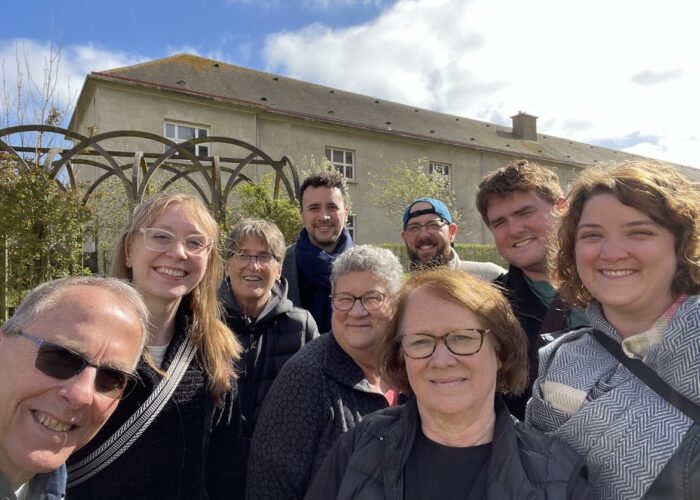SEOUL (Mennonite Mission Network/Mennonite Church Canada Witness) — The heart of busy Seoul seems an unlikely place for a business run by an Anabaptist/Mennonite organization.
The North American Mennonites working here are more accustomed to simple living and being the “quiet in the land,” but with the students enrolled in Connexus coming and going from 10 a.m. till 10 p.m., life is anything but quiet and simple.
Staff members at the Korea Anabaptist Center dreamed of a strong response when they announced the opening of Connexus, an English language ministry, in October 2004, but were surprised by what God had in store. Connexus has grown from two teachers instructing 18 students to five teachers and more than 110 students – with a rising need for more teachers to meet the demand.
Sheldon Sawatzky, Mennonite Mission Network’s director for East Asia, said the need is not limited to Korea. Iinternational partners across Asia are pleading for more workers to teach English in their communities and programs. “Teaching English as a ministry provides remarkable opportunities for sharing one’s faith in word and action,” he said. “We can immediately place scores of English teachers.”
Tim Friesen arrived in Korea in June 2005 as an intern with Connexus, which both Mennonite Mission Network and Mennonite Church Canada Witness support. An English major graduate from Canadian Mennonite University and engaged to be married next fall, Friesen came upon Connexus while looking for a unique cross-cultural learning experience in a supportive community.
His first time living in a metropolis like Seoul, some differences from North American life struck him as soon as he arrived.
“Something you will experience right away is Seoul’s ‘busyness,’” Friesen said. "There are people on the street at all hours of the day, it seems. People are on the go from between 4 and 5 a.m., when people start playing tennis at the courts near my apartment, to very late into the night.”
In the midst of activity, Friesen witnesses an alternative to the busyness by taking time to focus on relationships, whether in class or enjoying fellowship over a meal shared with Connexus and KAC staff at the school – a refreshing change in an area popular for its expensive restaurants.
These friendships between teachers and students, out of place in Korea’s deeply entrenched Confucian hierarchy and fast-paced business society, challenge the status quo.
“The main difference between Connexus and other English schools is the relationships that you have the opportunity to build with the students,” Friesen said. “Some will even spend all their time studying and you will see them every day. Some of the students will even cry at the end of the month when they are finished their classes and move on to other things.”
With classes of no more than six students, Friesen can get to know each student, not only to address language learning struggles, but to engage on a personal level as well.
As they learn to know one another, students and teachers take part in valuable cross-cultural learning. One student who finished her studies at Connexus several months ago recently e-mailed the staff that not only did she enjoy the friendships with teachers while she studied, but they had changed her perception of Westerners.
In Friesen’s experience, understanding is just one outcome of relationship-building with students. “Many people come to Connexus very afraid of foreigners. By the time they leave, the students are very open to talking to you and others that are different from them.”
Friesen said many foreigners in Korea do not spend time with Korean friends, but having a host family and strong connections in class gives him a different experience. Reaching across cultures, in an honest effort to learn from others, breaks down barriers of misunderstanding and fear.
Adapting to living with a Korean host family can be challenging, but provides additional help for Westerners in learning about Korean people and culture.
“Hospitality, for example, is something that is very important to the Korean people. This usually comes across as people buying you dinner,” he said. Paying for another’s meal is a sign of respect, which Friesen is growing to accept more freely. “I have had meals where I have had to literally jump up and run to the front in order to prevent other people at the table from paying for the bill.”
In his cultural learning, Friesen looks to both his North American and Korean co-workers at Connexus and KAC in trying to understand some parts of Korean culture that he might otherwise find overwhelming. The group also provides support, friendships and fellowship.
“The people that you work with will become a second family. It is very difficult to be homesick in this environment,” he said. “I came expecting to meet new people and experience a culture that I knew nothing about. I also came to learn about myself and to learn how to have a relationship over a very long distance. What I found was all of that and more.”
Cheryl Woelk serves at the Korea Anabaptist Center (KAC), facilitating peace-education programs through English conversation classes and creating resources for peace education in the Korean context. Both Mennonite Church Canada Witness and Mennonite Mission Network support her work.



